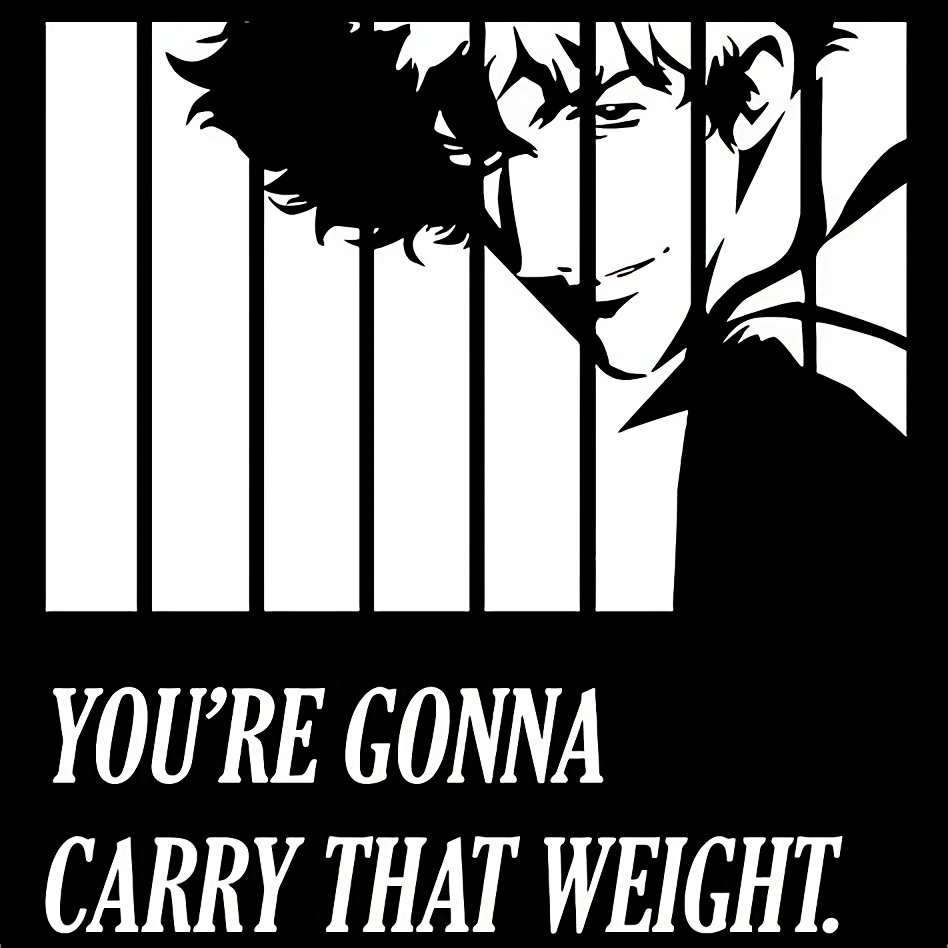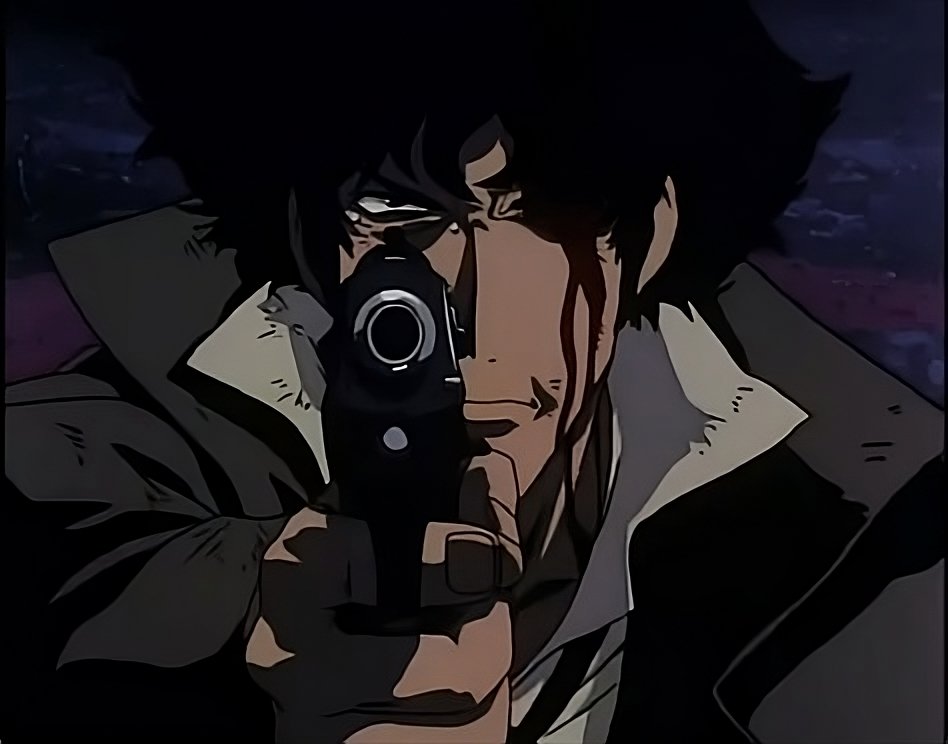‘Cowboy Bebop’: The Meaning of the Real Folk Blues and The Weight of One’s Life
“It’s all a dream… Yeah just a dream.” Prolific as any association with life possibly being a dream-like experience, what exactly does this quotation mean? To say that life has some fundamental purpose seems more wishful than anything, but when it comes to one’s more personal experience level, it becomes much equally beautiful, and terrifying to know that each of us carries the weight of our own lives, for better and for worse.
Cowboy Bebop’s finale explores this through the series protagonist Spike Spiegal and his final showdown with his arch rival Vicious, a ruthless mobster, as well as the perfect embodiment of the darkness that characterizes Spike’s past. His confrontation is tragic, yet equally cathartic in the closure it bestows him in the final moments of the series as he delivers his farewell “Bang.” It was the German philosopher Friedrich Nietzsche who said “You must have chaos within you to give birth to a dancing star.” In many ways, the last explosive moments of Spike Spiegal’s shoot out at the Red Dragon Syndicate headquarters carries enough chaos to not only give the last five minutes of any great anime series a bang out ending. But the final “Bang” he delivers with just the wave of a finger only makes the star that was prophesied by a Native American mystic to fall that more fitting in the value we all hold in carrying our own lives.
The mix of Native American belief that is sprinkled in the final episode of Shinichirō Watanabe’s genre bending masterpiece involves one key moment where Spike’s bounty hunting partner, Jet Black, visits Laughing Bull, the old Native American shaman who makes multiple appearances throughout the series. Aside from having a few epic philosophical lines, Old Man Bull further imbues the “all mystic” vibe that gives Bebop and the nature of its characters even more existential relevance. In his meeting with Laughing Bull, Jet is at his most desperate and in asking about where Spike is, he is told “Do not fear death. Death is always at our side. When we show fear, it jumps at us faster than light. But, if we do not show fear, it casts its eye upon us gently and then guides us into infinity.”
It’s nothing new to see a First Nations character showcased in a tv series or film to say something wise and prolific in its ability to truly capture the uniqueness of such a spiritually rich culture. But when something mystics say has the power to truly have you reflect and pontificate on something as inevitable as death, then that only speaks at length about their wisdom. Cowbody Bebop’s final episode operates as both a meditation on death and a personal eulogy for Spike Spiegal, who in confronting his past speaks to a degree about the type of peace most people, particularly in western culture aren’t taught to come to terms with when it comes to death and the sense of finality that we dread yet often somewhat throw under the bridge.
One of the more common ways that most people cope with the idea of death is through the religious context in which they attribute its association with a variation of what is perceived as an afterlife of sorts. In the traditional Judeo/Christian/Islamic view, the afterlife is perceived within the frame of a utopian paradise, while in the more eastern based belief systems, death is often associated within the frame of a higher state of consciousness. Cowboy Bebop is no stranger in its exploration of the religious and spiritual, and this goes beyond the scope of the 23rd episode, Brain Scratch, where the idea of fundamentalist cultism is explored. At the same time though, one of the key lines from the episode spouted by the cult figure Londes asks “Tell me, why do you think people believe in God? Because they want to, It’s not easy living in such an ugly and corrupt world, People are lost so they reach out.” Prior to that, he stated how instead of God creating humans, it was humans that created God. In the end, the idea that death can terrify the human animal to go to such lengths speaks to the degree that death can have on the actions we take. With a majority of the characters of Cowboy Bebop, it all boils back to the past and the acknowledgement necessary to achieve a sense of closure that can either lead to inner peace or even greater despair.
Cowboy Bebop’s two and half decade legacy has stood well, and its final line of “You’re Gonna Carry That Weight” has perfectly encapsulated the true relevance death has when we look deep within ourselves and further ponder what our lives truly amounted to. Bebop touches this concept of the pontification of death by having multiple characters wonder if it all was just a dream. The subjectivity of our own experiences and how they are essentially tied to the electrical inputs of our brain alone make them no different from a dream. Now, this doesn’t mean that life is a dream, or that a show like Cowboy Bebop is making some sort of objective claim. But then again, when it comes to the similarities that real life and dreams have with one another, it becomes difficult to not develop a sense of curiosity, especially when going back to the subject of death and how regardless of when it comes, the inherent inevitability that gives it so much weight ultimately makes the how of carrying that more incremental in the determination of the life we’ve lived up to that final “Bang.”
The brief glimpses we get into Spike Spiegel’s past are often scattered and rapidly disoriented in a way where it becomes difficult for anyone watching to truly define the nature of his relationship with characters like Vicious and Julia. At the same time though, this type of complexity doesn’t hurt the series so much as further bring the main point of confronting one's past more essential to the main theme of the narrative because we all have a past, and oftentimes, regret always makes it into the mix, so much so that in constantly revisiting it, it almost seems like an attempt at self-correction, as if we were trying to look for something specific, a singular moment that ultimately defined the present state of being we were in to wonder “Where did it all go to hell.” As common as those behaviors are, even they are met with the same scattered complexity that characterizes a man like Spike, who no matter what theories fans of Bebop will make about what exactly happened between him, Vicious, and Julia—aside from the love triangle—for it to all end in a violent shoot out where all three wind up dead and maybe more awake than what Vicious claimed Spike finally was. Regardless of what made Spike Spiegel’s past carry the weight that it did, the fact that he decided to carry that weight till the end is what really counts for him as a character, and for each of us in the shaping of our own life narratives. Much like the Space Cowboy, we each have our pasts, and how we chose to carry the weight that they embody will ultimately determine how much that final being shines.



